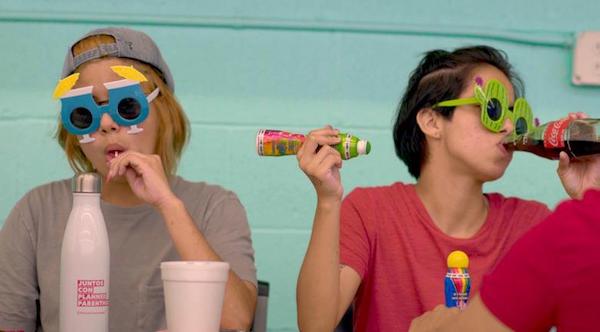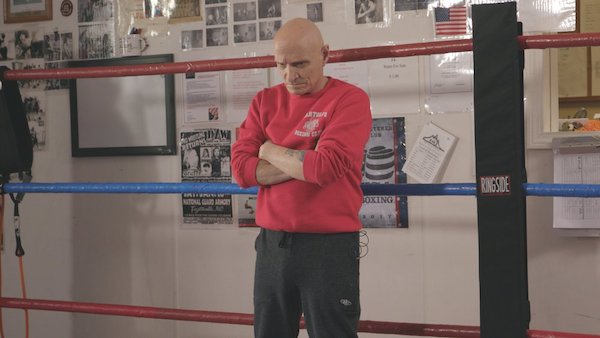Doc Talk: Celebrating Nonfiction Film at the IFFBoston — Seeing Afresh
By Peter Keough
This is what cinema is all about, and these will probably be some of the best movies you will see all year.
Documentaries dominate the 20th Independent Film Festival of Boston (April 26 – May 3) — out of 53 features, 32 are nonfiction films. Many are by local filmmakers, reflecting the vital and prolific Boston area documentary community. And all will take you to strange or familiar worlds that you will see with fresh eyes. This is what cinema is all about, and these will probably be some of the best movies you will see all year. Here are a few to get you started.

A scene from Christine Yoo’s 26.2 Life.
26.2 TO LIFE
Every year San Quentin’s 1000 Mile Club holds a marathon in which participants run around the prison yard 105 times. They follow a rough concrete and dirt pathway, dodging geese and other inmates, cheered on by team members and the volunteer coaches who have come in from the world outside. Sometimes a lockdown is called because of a security incident somewhere, halting the proceedings for a while, and then they resume, around and around the exhausting, tedious, dismal course, arriving at the end where they started.
It is, as one of the participants observes in Christine Yoo’s genial but slyly incisive film, a metaphor for serving time, a laborious grind with at best Sisyphean satisfactions. It also provides a loose structure for Yoo’s film as she intermittently takes a break from the ongoing race to profile some of those taking part. They all seem like good people who made a dreadful mistake or two, have learned their lesson, paid the price, and deserve a second chance. Even the guy with the swastika tattoo.
One of them gets that chance – the club’s star runner, Markelle Taylor, who not only earned parole shortly after the race but qualified for the Boston Marathon, which he finished just below his personal best time. Running, says another team member, saved his life. The film notes that of the 45 1000 Mile Club team members who have earned their freedom, none have returned to that prison yard.
26.2 to Life screens at the Somerville Theatre April 28 at 7 p.m.. Expected to attend are director Christine Yoo, producers Zahava Hirsch and Hella Winston, and subject Markelle Taylor.
ART FOR EVERYBODY
Nothing said bad taste in the ’80s and ’90s like the paintings of Thomas Kinkade, subject of Miranda Yousef’s thoughtful, comprehensive, and illuminating portrait of the artist. Endless canvases aglow with treacly landscapes, Hobbit-like cottages oozing welcoming radiance (Kinkade, stealing the sobriquet from J.M.W. Turner, described himself as the “painter of light”), and gingerbready snowglobe-like villages that define a certain kind of Middle American hell.
In the nascent culture wars of that time, he took the side of those who condemned provocateurs and transgressors like Robert Mapplethorpe and Andres Serrano. He demanded decent, uplifting, and universally accessible art, real art that celebrated American and Christian values. And Kinkade took this attitude and his products to the shopping malls of America, building a multimillion-dollar empire that put his images on prints, calendars, Christmas ornaments, and dinner plates, even building a model housing development in Vallejo, California, ominously called “The Village.” Explains Aaron Moulton, an art curator interviewed in the film, “He understood how to disperse his image in a way more advanced than anybody else — maybe even Warhol.”
But there was a dark side to Kinkade, who died in 2012 at 54 of acute alcohol and Diazepam poisoning after a decade of scandal-plagued dissolution that saw him groping women, accused of fraud, and pissing on a stuffed Winnie-the-Pooh doll in a Disneyworld Hotel.
And there was also a dark side to Kinkade’s art. Thousands of paintings, drawings, and works in other media had been kept in a vault that were found by his daughters and estranged wife after his death. Some have the eeriness of an Odilon Redon, others express the loneliness of a child raised in a broken home, others the truncated vision of an art student who dreamed of depicting the truth about a world full of pain and wickedness. Though some of Yousef’s expert interviewees are impressed by these works, one dismisses them as just more bad art, but of a different sort.
Art for Everybody screens at the Somerville Theatre on May 1 at 7 p.m. Expected to attend are director Miranda Yousef and producer Tim Rummel.

A scene from Rebecca Landsberry-Baker and Joe Peeler’s Bad Press.
BAD PRESS
Rebecca Landsberry-Baker and Joe Peeler’s incisive and suspenseful account of the trials of Mvskoke Media in Okmulgee, Oklahoma, the most important news source for the Muscogee (Creek) Nation, unfolds like a microcosm of the crisis that press freedoms are undergoing in the country at large. As an independent entity within the United States, the Nation’s government does not have to abide by the Constitutional rights outlined in the First Amendment. To rectify this, in 2015 they finally passed a Free Press Act that legislated these rights. But with a tribal election pending, the National Council bowed to pressure from the establishment candidates and not only revoked that act but dissolved Mvskoke Media’s independent editorial board.
Landsberry-Baker and Peeler follow the resourceful and sometimes desperate efforts by those fighting to restore the autonomy of Mvskoke Media. This is a textbook lesson in dogged local activism. Leading the way is Angel Ellis, a reporter and single mother determined to defend the integrity of her profession despite the personal sacrifices, stress, and acrimony. The fight takes many unexpected turns, with apparent defeats and false victories, and offers inspiration and instruction for those who would wage it nationwide.
Bad Press screens May 1 at 6:45 p.m. at the Somerville Theatre.
CONFESSIONS OF A GOOD SAMARITAN
In her previous films, Penny Lane has demonstrated a unique and vibrant sensibility as she combs archival sources, employs animation, and, more recently, engages in traditional investigative techniques, such as interviews and observational footage. She expertly collates this material into sardonic and empathetic explorations of subjects ranging from Richard Nixon (Our Nixon in 2013) to smooth jazz saxophonist Kenny G (Listening to Kenny G in 2021), from the Satanic Temple of Salem, Massachusetts (Hail Satan? in 2019) to Dr. John Romulus Brinkley, who claimed to cure impotence by transplanting goat testicles to humans (Nuts! in 2016).
In her new film she returns to the topic of organ transplants, but with a twist. The donor is herself. For some time she had pondered the nature of altruism, of empathy, wondering if she was a good person. Could she, for example, give one of her kidneys to save a stranger’s life? In the aptly titled Confessions she confronts these and other (literally) gut-wrenching topics, achieving a sometimes queasy, utter honesty but also maintaining a clarifying, ironic detachment. A dark sense of humor also helps her through the most painful stages of her project. In the course of recording her experience she also presents a history of organ transplantation, interviewing experts in the field and other altruistic transplant donors to examine this phenomenon and the precious human impulse that motivates it.
Confessions of a Good Samaritan screens April 28 at 7 p.m. at the Brattle Theatre. Expected to attend is the director Penny Lane.

Silvia Del Carmen Castaños, Estefanía ’Beba’ Contreras in Hummingbirds.
HUMMINGBIRDS
In their debut feature Silvia Del Carmen Castaños (now Boston-based) and her best friend Estefanía ‘Beba’ Contreras hang out in their hometown of Laredo, Texas, near the Mexican border. Silvia was born in the US but at that time Beba was undocumented. She was waiting for papers to come through. It’s a situation, though not always directly confronted, that hovers in the background of lazy days and evenings that both know are magical and transient.
Not much happens in the film, but then so does everything, as is usually the case for those living on the cusp of adulthood. In mood, the film evokes variously Richard Linklater’s Dazed and Confused (1993) and Terry Zwigoff’s Ghost World (2001). But these two young women also engage with substantive political issues, though in a playfully subversive way, as when they disguise themselves, sneak onto someone’s yard, and alter the message of an antiabortion sign. Their film serves up the kind of wise-beyond-their-years insights into the nature of time, memory, and experience seen in Charlotte Wells’s much-lauded Aftersun (2022).
Hummingbirds screens at the Somerville Theatre April 29 at 4:30 p.m. Expected to attend are director Silvia Del Carmen Castaños and producer Jillian Schlesinger.
KOKOMO CITY
Like a fusion of the candy-colored grunge and outrageous shenanigans of Sean Baker’s Tangerine (2015) and the harsh and evocative monochrome realism of a ’60s Shirley Clarke documentary, D. Smith’s Kokomo City electrifies with its stories of four Black transgender sex workers in New York and Georgia.
The tone is set with its opening monologue, in which Liyah Mitchell of Decatur, Georgia, relates how a john had a gun, which she grabbed and turned on him. She pulled the trigger repeatedly but got only clicks and the two then desperately fought over it. The story is fraught, told with good-humor and zest, and fortunately has a happy ending.
Other stories are not so upbeat. Like that of Koko Da Doll of Atlanta, who got into the sex work business to provide for her homeless family. After the film was made, just a few days ago on April 18, she was murdered.
Despite the hardships, dangers, and ostracism they encounter because of their sexual identity, these women embrace their lives with grace, hilarity, style, and an expansive humanity. Smith, who shot, edited, and produced on a shoestring, adds a lively soundtrack ranging from disco to hip-hop. There are also moments of slow-motion as well as inserts featuring some cheeky reenactments. All of these ingredients are briskly edited together. Smith encourages her subjects (including some men) to speak their mind on topics like the conflicted, even hypocritical animus shared by some of the mostly Black, cis male clients, and how their own background of oppression causes them to turn their rage against the even more oppressed trans women whose bodies they desire.
Kokomo City screens at the Brattle Theatre May 1 at 9:30 p.m.

A scene from Naomi Yang’s Never Be a Punching Bag for Nobody.
NEVER BE A PUNCHING BAG FOR NOBODY
Naomi Yang, a Boston filmmaker and musician, achieves a quintessential documentary task. Her film examines a seemingly quotidian subject and not only finds it to be a key to local, social, and cultural history but also a way to look deeply into her own life.
Searching in the East Boston area for a funky local setting for a fashion shoot, she came across Sal Bartolo Jr.’s boxing gym out by Logan Airport. Sal turned down her request to shoot there — he’d been burned before when someone used the premise for a similar purpose: the high-heeled shoes ruined his flooring. But something appealed to Yang about the place, and though she had a horror of the sport itself (she had covered her eyes for most of Raging Bull), she decided to take lessons at the gym.
Bartolo, an ex-drill instructor, doesn’t go easy on Yang, and she struggles through her first push-up and even more so through her first sparring bout. She can’t bring herself to fight back, a trait she traces back to her upbringing. But while touring the neighborhood she runs into people who do fight back, such as Mary Ellen Welch, who in the ’60s mobilized the community to resist the expansion of Logan Airport, which was then seizing parcels of East Boston real estate and uprooting families who had lived there for generations. Yang covers a lot of ground in this deceptively simple 67-minute film, from how to throw a punch to how to organize a movement for social change.
Never Be a Punching Bag for Nobody screens at the Brattle Theatre April 30 at 7:45 p.m. Expected to attend will be director Naomi Yang, the editor Ian Coss, and subject Sal Bartolo Jr.
THE ORDER OF THINGS
Slow, deliberate, precise, and meticulous, much like the watch repair work of its subject, Jeff Daniel Silva and Ramona Badescu’s The Order of Things (the title taken perhaps from the book by Foucault) probes the past horrors of a despotic regime and its lingering impact on a now 90-year-old victim.
The latter is Alexandru Badescu, Ramona’s grandfather. In the ’50s, under the Soviet-imposed dictatorship of Gheorghe Gheorghiu-Dej, precursor to the even more heinous dictatorship of Nicolae Ceaușescu , the man was repeatedly and without cause arrested, interrogated, and imprisoned in labor camps.
Today he is seen at his modest home tending his tomato plants, or at his shop where he acts the good-natured curmudgeon with customers who bring in their battered time pieces for an overhaul. Now and then he sits at a table where he picks up a folded piece of paper put there by the filmmakers on which is written a word such as “SNOW,” “TRAIN,” or “LIGHT” that will trigger a memory from his imprisonment.
The word “EVENT” stirs a recollection of a prisoner who could no longer take the cold, the hunger, and the beatings and wandered off so the guards would shoot him. They refused to comply, so later he placed his head down in front of a moving train and was decapitated. The word “JOY” prompts his memory of a rare care package from his wife, which not only contained food and clothing but also a covert message that she had given birth to their child.
Beautifully photographed and impeccably edited, the film recalls the artistry of Romanian New Wave Cinema with its images of everyday existence shimmering with numinous possibility.
The Order of Things screens at the Somerville Theatre April 29 at 2:15 p.m. Expected to attend is the director Jeff Daniel Silva.
Peter Keough writes about film and other topics and has contributed to numerous publications. He had been the film editor of the Boston Phoenix from 1989 to its demise in 2013 and has edited three books on film, most recently For Kids of All Ages: The National Society of Film Critics on Children’s Movies (Rowman & Littlefield, 2019).
Tagged: 26.2 TO LIFE, Andrea Segre, Art for Everybody, Christine Yoo, CONFESSIONS OF A GOOD SAMARITAN, D. Smith, documentaries, Estefanía “Beba” Contreras, HUMMINGBIRDS, IFFBoston, Joe Peeler, KOKOMO CITY, Miranda Yousef, Naomi Yang, Never Be a Punching Bag for Nobody, Penny Lane, Rebecca Landsberry-Baker, Silvia Del Carmen Castaños, THE ORDER OF THINGS

Wonderful summaries – especially intrigued by your Kokomo description.
thanks!